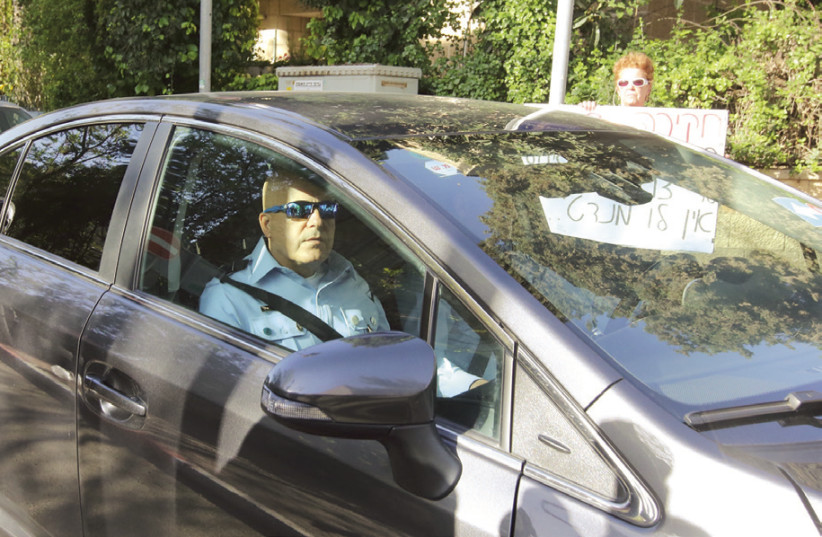The cross-examination continued for Case 4000 on Monday at the Jerusalem District Court, with Dr. Yifat Ben-Hai Segev, former chairperson of the Cable and Satellite Council, being questioned by former prime minister Benjamin Netanyahu's defense attorney, Boaz Ben Tzur.
The prosecution witness, whom the prosecution asked to present as a hostile witness, said at the beginning of her statement that since her testimony last week, she finds herself "subject to slander and pointless leaks, all of which have the purpose of scaring me from telling the truth. I am determined to tell the truth, the whole truth and nothing but the truth."
Ben-Hai Segev claimed during her cross-examination that the investigation conducted on her by the Israel Securities Authority was biased and that the investigators asked for Netanyahu's "head" in advance.
"It was clear to me from day one that they were trying to connect Netanyahu to the process," she said. "The goal was marked in advance and now all we had to do was get the pieces moving."
Ben Tzur showed several correspondences in court aimed at proving that the person who leaked the information about the meeting between Ben-Hai Segev and David Sharan, the head of Netanyahu's office, to Israeli businessman Shaul Elovitch was not Netanyahu but David Sharan himself.

Ben Tzur then claimed that Ben-Hai Segev was misled into having to serve Netanyahu's head on a platter.
The dialogue was then as follows:
Ben Tzur: Your understanding in the investigation at the Securities Authority was that it was Netanyahu who leaked the information about your meeting with Sharan to Elovitch?
Ben-Hai Segev: That's why I brought up political affiliation. I told them that I have no interest in defending Netanyahu, and I do not come from his political camp.
Ben Tzur: It came up several times in the investigation?
Ben-Hai Segev: Of course, otherwise why would I mention political affiliation? They expected me to come with a knife held in between my teeth, carrying Netanyahu's head.
Ben Tzur later continued to try and crack the prosecution's theory that Ben-Hai Segev got the impression during her investigation by the police that the level of prioritization of the Bezeq-Yes merger came from the director-general of the Communications Ministry at the time, Shlomo Filber, on Netanyahu's behalf.
Ben Tzur presented a letter that the witness sent to Netanyahu in which all the relevant factors were written.
Ben Tzur: You said that the issue should be moved forward as soon as possible and at a high priority level. Now in the investigation, did they make you understand that the attempt to move it forward came from Filber?
Ben-Hai Segev: I understood in the investigation that, yes, it all started with Filber.
At that point, Ben-Hai Segev said what could be considered an explanation for her contradictory testimony towards the position of the prosecutor's office: "Beyond that, they made me think that I was a criminal, that everything was done hurriedly, that there were no discussions or correspondence prior, and that the Communications Ministry was not involved."
Ben Tzur: They asked to declare you here in court as a hostile witness, and said that you did not say in your investigation that Mr. Berger, for a certain time, did not hold a position of control. They told you, "Excuse me, you didn't say that in your report to the police and you are therefore a hostile witness."
Prosecutor Yehudit Tirosh objected, saying, "This is a deception of the court. What we said is that Berger delayed things for his own reasons and she didn't say that in her testimony to the police. The second reason was that we were talking about general hostility, a legal concept recognized in case law. And the witness, even today, says that the things she said in her investigation were not true."
Ben-Hai Segev: I am asking the judges to protect me, there is a limit to how much you can defame me.
Judge Rivka Friedman-Feldman: This is a conversation between two lawyers right now, [you] cannot intervene.
What is Netanyahu accused of?
Case 4000 (the Bezek-Walla affair) is the most incriminating for the former prime minister. It deals with regulatory benefits worth hundreds of millions of shekels that Netanyahu allegedly granted to Elovich. In return, according to the indictment, Elovich worked to bias the coverage on the Walla! website in Netanyahu's favor. In this case, Netanyahu is accused of bribery.
Shaul Elovich, the controlling owner of the Eurocom group through which he controlled a number of public companies, including the Bezeq group and Walla!, is accused alongside his wife Iris Elovich of bribery and obstruction of justice in Case 4000.
